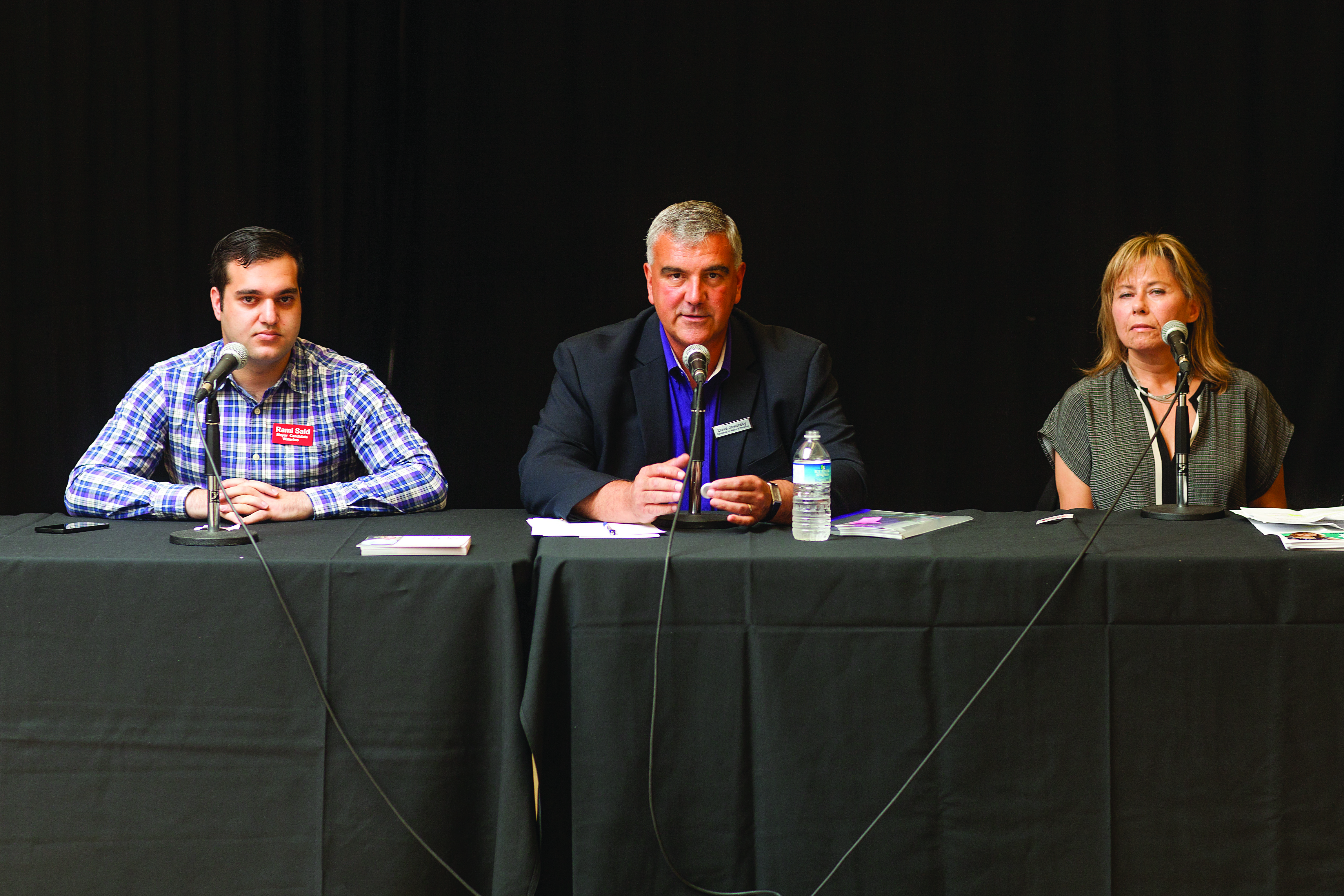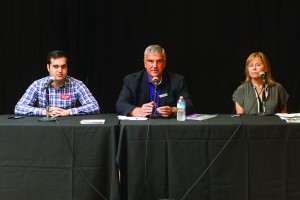Mayoral candidates consider student demographic

The leverage that post-secondary students in Waterloo hold due to their large population in proportion to permanent residents is something that most of the mayoral candidates for the municipal election are not taking lightly.

The leverage that post-secondary students in Waterloo hold due to their large population in proportion to permanent residents is something that most of the mayoral candidates for the municipal election are not taking lightly.
Before the end of the campaign period, the candidates – Erika Traub, Dave Jaworsky, Dave MacDonald and Rami Said – will have had several opportunities to interact with students at on-campus events and put forth their own efforts to reach out.
Rick Camman, vice president of student affairs at Wilfrid Laurier University’s Students’ Union, explained that Jaworsky was the only candidate to initiate contact with the Union. Camman and two other members of the Union were invited to his office to pose questions and get clarification on his platform.
While the rest didn’t reach out first, Camman was able to get in touch with them for the mayoral debate, which was held at Laurier last week. In terms of those who attended, he said he was happy to see how engaged they were with students.
“They all seemed very student-friendly,” he said. “They do seem to have an understanding of at least some of the issues facing students. It was very refreshing.”
Traub, Jaworsky and Said were present at the debate.
In addition, a meet and greet for students and candidates was hosted at the University of Waterloo on Tuesday – all four mayoral candidates were in attendance. Lastly, a debate will be held at UW on Oct. 20. Stephane Hamade, vice president of education at the Federation of Students at UW, said he is still awaiting one candidate to confirm their attendance.
“We’re hoping – going forward after this election – to see the city and the region more engaged with students in general,” said Hamade. “Better informing us with things that are happening in the city, getting more students involved on committees and hopefully attracting more with students.”
Hamade has been meeting with some of the candidates to discuss goals to be implemented following the election that will have a positive impact on students. Some of the issues they are touching on involve Grand River Transit, Light Rail Transit, restorative justice programming and housing.
“We’ve had pretty good feedback from each of the candidates we’ve met with about these ideas,” Hamade said. “So we’ll see if we can hopefully implement them going forward.”
Camman said they are going to wait to see who is elected before moving forward with any goals for collaboration.
“The university isn’t going anywhere, so how can we best work with them to make sure that this is an even better city going forward for students and make them want to stay here after graduation,” he said.
Said explained that he lives around students on Albert Street and it has made him very familiar with the student culture in Waterloo.
“I live in an apartment that has a good mix — there are young people, old people, students, young professionals, families and to me it builds a really good culture,” Said continued. “That’s kind of what I want to see the city developed to.”
From speaking with students, he said he’s realized many feel as though they are being pushed out of the city and are unwanted.
“To me that’s not what the city is about,” he said.
“You should be welcome no matter where you go and you should be part of that community.”
If elected mayor, Said stated he is planning on implementing brown bag meetings to try and continue to facilitate communication with students and as community members at large.
These are informal meetings with councillor members and the mayor would host monthly at local venues to discuss issues.
“The big issue I find is that we invite people to city hall and when they come to city hall they have about two minutes to talk,” he said.
Conversely, the brown bag meetings would allow for fuller discussions.
MacDonald explained that he hasn’t had much of a chance yet to meet with students because his focus has largely been on homeowners. His reason for this, he said, is because homeowners are the ones who are paying taxes.
“They’re the ones that you have to focus on because you have to let them know that you have their concerns at heart and that you’re going to work hard to keep those tax bills under control so that they can afford to stay in their homes,” he said.
Many older people, he continued, have come to him concerned that if taxes rise they will have to sell their homes.
In terms of student issues, MacDonald said he’s interested in hearing what their concerns are and seeing if the city can help in any way.
“One of my policies as mayor is to have an open door policy and to be available and accessible to any and all who live in the city,” he said.
“So I would hope that that would apply to any student who had any issue at all whether it be with a landlord or a city service, whatever it might be.”
Jaworsky said he is already very familiar with the student culture in Waterloo because he was a student here.
“[Students] certainly understand that I have a similar background, coming here to university. The next step for them is finding that job,” he said.
“One of the key pieces of my platform is rebuilding prosperity, attracting jobs to Waterloo region.”
In addition to attending the events hosted by the universities, Jaworsky has been canvassing in student neighbourhoods. He explained that you just have to look at the local economy to understand why student needs need to be addressed.
“The universities are responsible for $1.5 billion in gross domestic product, GDP economic activity here in our area,” he continued.
“And those 50,000 students are part in parcel of that economic success. So it’s really focusing on their success, keeping the universities not cities within the city but engaged within our community and a part of our community is key to me.”
Traub also has first-hand experience with student issues in the city, having attained two degrees from UW.
One of the issues she has heard from students is their concern over access to GRT late at night.
“Classes tend to go late, people have to study late, having a bus that doesn’t show up or students — particularly females — using the system on their own feel very vulnerable and unsafe,” she said.
“So that’s a big issue in my mind.”
Traub said it’s important for her to be reaching out into the community to interact with students because she believes this is where the solutions lie.
“It’s not for council or any level of government to have an opinion about what the answer is to our problems without actually going down and talking to the people who are involved — to the stakeholders,” she said.
“I’d like to get things right.”


